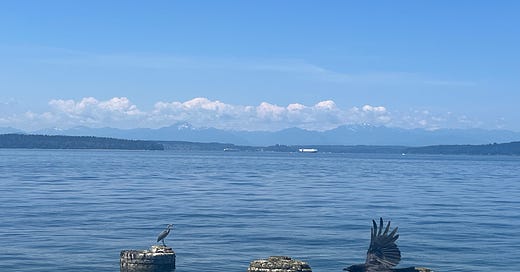From
I was advised to write in places with no windows.
A sensory deprivation to trigger
memory: Oak Street or the back
of a cereal box. Mind, how night
darkens, daybreak, line out the door.
Loon grazing dark water
so close to the Earth.
But water is my thoughts now.
A great log coasts in on the back of mist,
coming down from the Olympics.
Today, a duck I’d never seen,
black head with a white dot, Goldeneye, diving,
diving, diving. To plunge deep
or soar with only feathers to show for it—
wide-ranging delight —
enter the roiling northern estuary,
body screaming, giggling at the touch,
at the touch.
Then the shivering.
Arteries flood after bracing.
Strange how it sits like a drug
on the morning, how the devils float on
after leaving, dripping, coursing.
How the driftwood stays too.
If only one could write of a place,
from a place, then the poet
I’ve been thinking a lot about the literal space writers write from, and how important it is. Not in like a “everything has to be dialed in” kinda way (although that is kinda true for me), but more in the sense that whatever is in your line of sight will likely play more of role in your writing universe. Just in the last few years, my writing spot (dining room table) has largely shaped what I write when I don’t know what to put down. Christmas cactuses, pottery odds and ends, houseplants, shadows… all things that breach.
In Annie Dillard’s The Writing Life she talks of her writing environment and this is who I paraphrase at the beginning of this poem. She says that a core part of her writing environment is the absence of windows, a limitation to coerce memory. I may like morning light too much to make this a real practice, but I have noticed (and shared before) how it is nearly impossible to write a good poem with a view.
I’ve started getting in the Sound a number of times per week … we will see if it sticks through the winter. For now, it’s lovely, albeit chilly. I’ve been reading Waterlog by Roger Deakin, someone who swam all the wild water ways in the UK.
With Gratitude,




